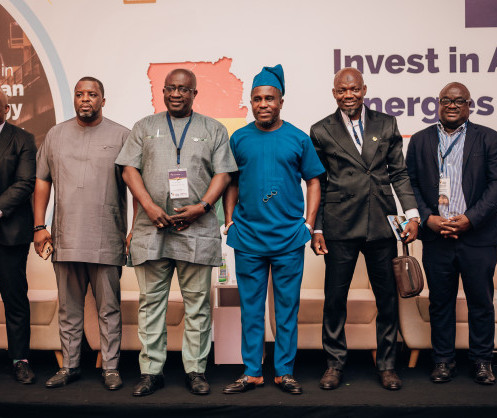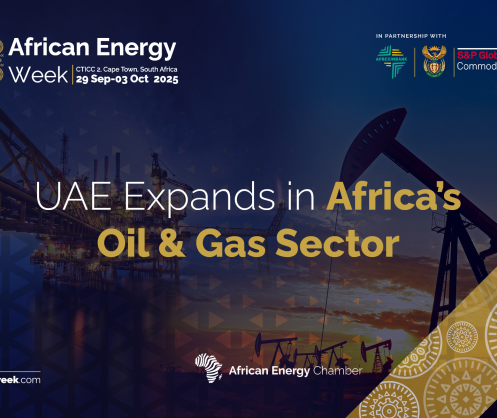
The AEC has consistently taken a strong stance against the foreign exchange regulations imposed by the BEAC, describing these policies as “absurd,” “hostile to foreign investors” and out of step with global financial norms.
On March 25, the proposed “Central African Exploitation and Manipulation of American Companies Act” (apo-opa.co/4i1CeP3) was brought before U.S. Congress, seeking to suspend U.S. support for International Monetary Fund (IMF) actions involving member states of the Central African Economic and Monetary Community (CEMAC) until accurate foreign reserve disclosures are made. The bill was introduced by Congressman Dan Meuser, U.S. Representative for Pennsylvania’s 9th congressional district, and Congressman Bill Huizenga, U.S. Representative for Michigan’s 4th congressional district, and referred to the Committee on Financial Services. The African Energy Chamber (AEC) (https://EnergyChamber.org) strongly endorses this bill, which signals to the Bank of Central African States (BEAC) that their opaque and restrictive foreign exchange policies are no longer acceptable, and stands in solidarity with U.S. lawmakers in calling for BEAC to act with pragmatism and common sense to avert further economic harm to the region.
The AEC has consistently taken a strong stance against the foreign exchange regulations imposed by the BEAC, describing these policies as “absurd,” “hostile to foreign investors” and out of step with global financial norms. By restricting the flow of foreign currency in the region, these regulations undermine investor confidence, delay payments to contractors, prevent repatriation of capital and inject unnecessary risk into energy projects. The regulation stands to reduce foreign investment in the CEMAC region by $45 billion by 2050 while reducing government revenue for CEMAC countries by $86 billion.
The impacts of this cannot be overstated. Rich in oil and gas resources, the CEMAC region has the potential to leverage its natural resources for large-scale and long-term economic growth. American operators – with their expertise and strong presence in the region – would play an instrumental part in realizing this goal. These include energy majors such as Chevron, ExxonMobil, Vaalco Energy and more. Beyond US firms, other major players such as TotalEnergies, Trident Energy, BW Offshore, Eni and Perenco stand to hold back on investments, significantly impacting the region’s energy future. Without these firms, the region stands to lose out on major projects.
We have always called on BEAC to behave in a reasonable fashion and look at what is in the best interest of Africans
Equatorial Guinea’s Gas Mega Hub, for example, will monetize the region’s gas resources. Led by Chevron and Marathon Oil, the project processes gas from the Alba field at the Punta Europa LNG facility. The agreement for the second phase – which would tie in the Aseng field – has already been signed while agreements with neighboring Cameroon and Nigeria to import gas are in place. Cameroon is making strides towards unlocking value from its underdeveloped gas resources while Gabon is progressing an FLNG facility that would produce 700,000 ton per year of LNG and 25,000 tons of LPG. Developed by Perenco, the project is on track to start in 2026. The Republic of Congo is scaling-up its LNG capacity at the Eni-led Congo LNG project. The company targets 3 million tons per annum in 2025. In tandem, aligned with national goals to increase oil output to 500,000 barrels per day, TotalEnergies is investing $600 million in the country’s Moho Nord field. However, these efforts will only succeed if BEAC creates a more transparent and stable monetary environment.
The introduction of the CEMAC Act marks a significant shift in how the international community views BEAC’s policies. U.S. lawmakers, reflecting the views of the AEC and many African business leaders, are taking decisive action where African governments should have acted long ago. African businesses overwhelmingly support this legislation because it holds BEAC accountable and compels much-needed reforms. For years, the AEC has been calling on African leaders to push BEAC into adopting more transparent, investor-friendly policies. Now, with the U.S. stepping in, the pressure is on BEAC to respond. By withholding U.S. support for IMF actions, the proposed legislation signals that these monetary policies have undermined global confidence and now present a risk to the international financial system, which could have a domino effect on development financing, debt restructuring efforts and future IMF programs.
“We have always called on BEAC to behave in a reasonable fashion and look at what is in the best interest of Africans and not receive job- and investment-killing pressure from the IMF that would deter investment and lead CEMAC countries into sanctions or trade-restrictions that will bring its citizens into further poverty. BEAC needs to act better and this is a wake-up call for us to understand that investors putting money into the region can no longer be treated in ways that do not act in the best interest of both citizens and investors. They have a new opportunity to get back to the table and do the right thing by getting rid of these regulations that are keeping our region behind. We at the AEC understand the position of the U.S. congress, and as people who have always called for pragmatic and commonsense approach to these issues, we think that we have an obligation to protect investors while encouraging growth, jobs and opportunities for CEMAC countries,” states NJ Ayuk, Executive Chairman of the AEC.
The AEC is committed to supporting dialogue and collaboration between public and private sector stakeholders to ensure these critical changes are made. It is clear: BEAC’s outdated foreign exchange policies are no longer acceptable, and reform is urgent. The potential passage of the CEMAC Act is a wake-up call, and the AEC urges BEAC and policymakers in Central Africa to view this as an opportunity to create a fairer, more functional financial ecosystem that will attract international capital and support the region’s industrial ambitions. Central Africa’s energy transition, its economic future and its ability to compete on the global stage are all at stake. By reforming BEAC’s mandate and aligning its policies with global standards, the region can build the trust and stability it needs to attract the investment essential for its long-term prosperity.



